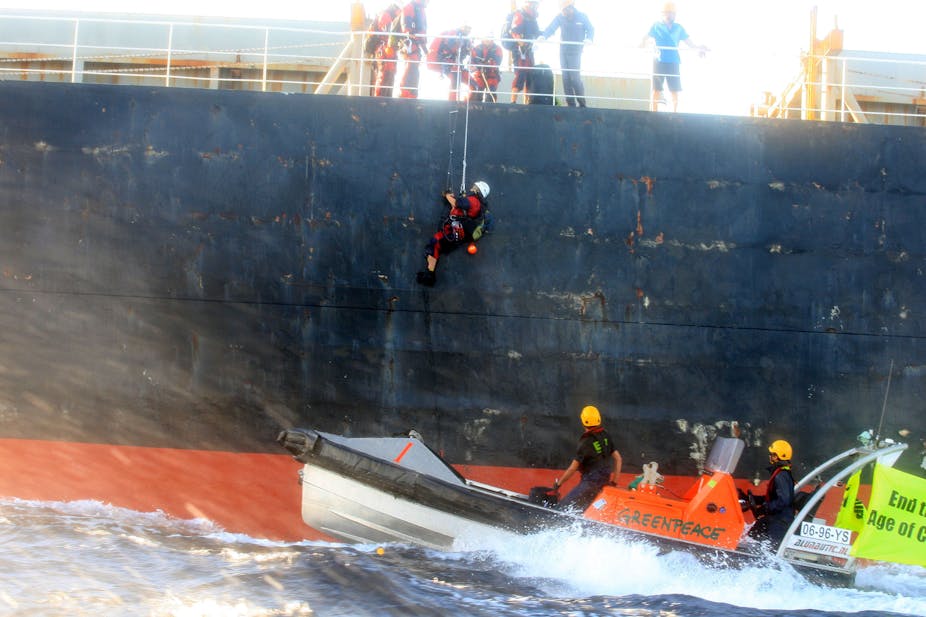Greenpeace’s attempt to stop a ship carrying Australian coal is an opening shot in what is likely to be an escalating campaign of civil disobedience directed at Australia’s export coal industry. The raid is an expression of the fact that — with the exception of nuclear holocaust — nothing has threatened the future of humanity as global warming now does.
During the Cold War the proliferation of doomsday weapons saw the world at times reach the brink of annihilation, a kind of madness that prompted large numbers of otherwise peaceable citizens to make a conscious decision to break the law.
To date the campaign to protect Earth’s climate has been mostly law-abiding. But that is changing as campaigners, including many young people, accept that they must take greater risks. In 1960 Bertrand Russell defended the need for direct action in a time of “utmost peril” and [called on](http://en.wikipedia.org/wiki/Committee_of_100_/(United_Kingdom/) those feeling disempowered to engage in direct action because “you will be doing something important to preserve your family, compatriots and the world”.
Over the last 20 years environment groups around the world have been models of civic decorum, playing the conventional game of political lobbying and public relations. But some have tired of being fobbed off with promises.
In the United States, under pressure from members exasperated with the political system, the Sierra Club, the nation’s biggest, oldest and most venerable conservation organisation, has now endorsed non-violent civil disobedience as a response to the opening up of new sources of fossil energy.
The Sierra Club’s Canadian spokesman put it succinctly:
Science, logic and huge public support for action have all been thwarted by the fossil fuel industry and governments that do their bidding. People of conscience have been left with nowhere else to turn.
The same could be said for Australia, and that is why the Greenpeace action is not only to be expected, but has been a long time coming. In a recent opinion piece flagging a change in direction, Greenpeace chief executive David Ritter wrote of the betrayal of our political system in the face of repeated warnings about climate disruption. “Civil disobedience is about peacefully standing up for a fair go or to stop something precious from being destroyed,” he wrote.
The political systems of nations like Australia have proven incapable of responding to the increasingly dire warnings of the world’s most authoritative climate scientists, including those gathered in the most prestigious scientific academies.
Every week we read new and more alarming evidence of the scale of the threat. The annual ice melt in the Antarctic has accelerated dramatically in recent decades. The Arctic is described as being in a “death spiral”. Feedback effects are kicking in earlier than expected with melting permafrost releasing methane and carbon dioxide into the atmosphere.
The warnings have become so clamorous that bodies as conservative as the IMF and the World Bank have called for immediate action. IMF chief Christine Lagarde recently declared that without rapid action to counter global warming, the next generation would be “roasted, toasted, fried and grilled”.
As the evidence of the peril mounts, global carbon emissions are not falling or even slowing, but accelerating, as if humanity has some kind of death wish. Unless stopped, the rapid expansion of Australia’s coal exports will be a major contributor to the destabilisation of Earth’s climate in the coming decades. The effects will last for centuries.
Australia’s total greenhouse gas emissions last year were 550 million tonnes. With a coal mining boom now underway, by 2025 annual emissions from Australia’s coal exports are expected to reach somewhere between 1300 and 1700 million tonnes. Every tonne of coal Australia exports causes damage to the wellbeing of future generations.
In a situation where the facts overwhelmingly demand sweeping measures to protect humanity yet our political system seems unwilling to respond, what is a concerned citizen to do? In a land where the voters can choose between a party that believes in incremental progress (while overseeing a rush to accelerate coal exports) and one that is dominated by deniers who refuse to accept the scientific facts, how can anyone make a difference?
Is it enough, for a person of conscience, to sit back and wait for the harms to become intolerable? For some, including the Greenpeace activists, the situation is impossible. When all legitimate means have been exhausted, the only alternative to apathy and despair appears to be civil disobedience. They feel that their duty to a higher law overwhelms their allegiance to those on the statute books.
Such a duty can never endorse violence, but that does not rule out physical acts aimed at preventing the harm being done. The kind of action taken by the activists from the Rainbow Warrior shines a light on the hypocrisy of authorities who use smooth words to persuade us that they accept the danger yet vigorously promote the activities that are making it worse. We can expect today’s dramatic events to be the opening shot in a long campaign.

